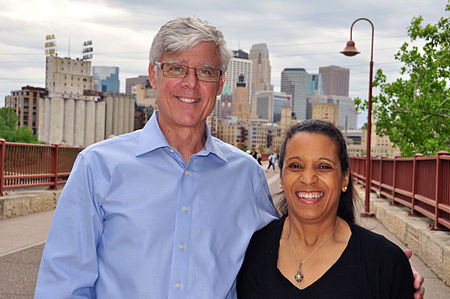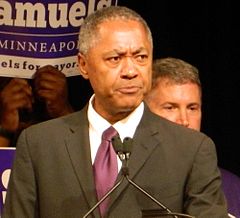Minneapolis mayoral election, 2013
|
|
|||||||||||||||||||||||||||||||||||||||||
|
|||||||||||||||||||||||||||||||||||||||||
|
|||||||||||||||||||||||||||||||||||||||||
|
|||||||||||||||||||||||||||||||||||||||||
The 2013 Minneapolis mayoral election was held on November 5, 2013 to elect the Mayor of Minneapolis for a four-year term. This was the second mayoral election in the city's history to use instant-runoff voting, popularly known as ranked choice voting, first implemented in the city's 2009 elections. Municipal elections in Minnesota are nonpartisan, although candidates are able to identify with a political party on the ballot. After incumbent Mayor R. T. Rybak announced in late 2012 that he would not seek a fourth term, 35 candidates began campaigns to replace him. Many of these candidates sought the endorsement of the Minneapolis unit of the Minnesota Democratic–Farmer–Labor Party (DFL), though the convention ultimately ended with no endorsement.
Although she did not win enough votes to be victorious on the first ballot, DFLer Betsy Hodges held a "commanding" lead and was "poised" to be elected following completion of vote tabulations. Second-place finisher Mark Andrew effectively conceded on election night, saying that it was unlikely that he would overcome Hodges' lead. Hodges was elected in the 33rd round after two days of vote tabulations.
Minneapolis' 2009 elections were the first in the city's history to implement a system of ranked choice voting (RCV), whereby voters ranked up to their first three choices for an office instead of voting for just one. Turnout that year was, however, the city's lowest in decades with under 46,000 ballots being cast. Incumbent mayor R.T. Rybak won over 33,000 of those votes on the first round of voting, surpassing 22,579 which was the threshold of 50% of ballots cast plus one that were necessary to win the election. A 2010 report prepared for the Minneapolis Elections Department by David Schultz and Kristi Rendahl of Hamline University determined that it was unclear whether the RCV system had met its stated goals of "increasing voter turnout, encouraging more candidates to run, [and] promoting more support for third party candidates."
...
Wikipedia




